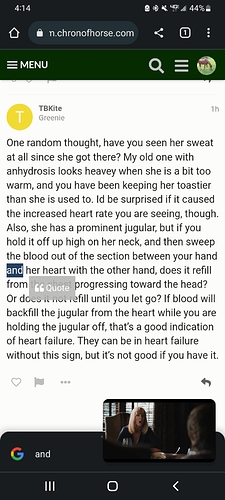Sorry for the novel.
TLDR: 22YO OTTB with spooky behavior change and weight loss, no liver/kidney/protein issues, eating a LOT of food.
I took on a 22 YO OTTB last spring. He was a bit underweight but not terrible. Mostly just not a ton of top line. He had to have some teeth pulled and basically has no upper front teeth. Over the summer he just hung out; plan was for him to gain weight over the summer and then I’d put him into work sometime in the winter so that he could go get leased out in the spring. He’s a really good guy, has all the buttons, and would love a kid to pack around over poles and cross rails.
He gained weight well, but slowly as one would expect with an older OTTB, over the summer and early fall on 4 pounds TC Senior Gold (plus a 1/2 pound ration balancer since it wasn’t quite enough for the minerals) and grass. As winter set in (mid November) I started feeding free choice 2nd cut hay and upped his grain to 6 pounds. At the beginning of December I noticed he was dropping a bit of weight, so I added two more pounds of TC Senior Gold, plus a cup and a half of oil. I also kept him in for 24 hours with the hay he gets outside to make sure he was eating ok. He ate about 25 pounds in that amount of time. (And I wouldn’t be surprised if he actually eats more when out with his buddies; he was a bit concerned about being inside for that time). Total estimated calorie consumption per day is 38,000.
Right after Christmas I pulled his blankets off after our cold spell and went ‘woah. What the heck?’ He looked like he had lost 50 pounds in a week.
Well, then on Sunday night he acted strange. Like he couldn’t figure out where the gate was to go to his stall. He was whinnying for his grain but couldn’t seem to find the door. I thought it was weird but didn’t think much of it. Then the next day he was afraid of his feed bucket and me.
Had the vet out, and she agreed this was very weird. He is getting more than enough calories. All of the other ancient ones are looking very nice on this hay, and clearly he was eating it no problem. His behavior had also changed considerably; very twitchy, scared of everything. This was the horse who didn’t spook at anything and was so, so chill. Teeth are still missing but no worse. No issues with any of the neuro exam. However, he has a grade 3/5 heart arrhythmia which is new since he was vaccinated in October.
The results for his liver, kidney, and protein levels came back normal. We are testing for EPM but the results won’t come back until next week. He has no incoordination, ataxia, isn’t lame, stiffness, etc. None of the symptoms I’ve seen with it. Cushings comes to mind, but doesn’t explain the behavior change and besides being skinny he has no other symptoms of that either.
Hes UTD on vaccines, was dewormed twice this fall, no previous known injuries or issues.
Thoughts? Maybe I’m just on edge but I’m dreading this ends with me digging a very large hole. I’ve lost one cat in the past three months and another is currently on her last days. I can’t take 2023 and it’s only 4 days in!


